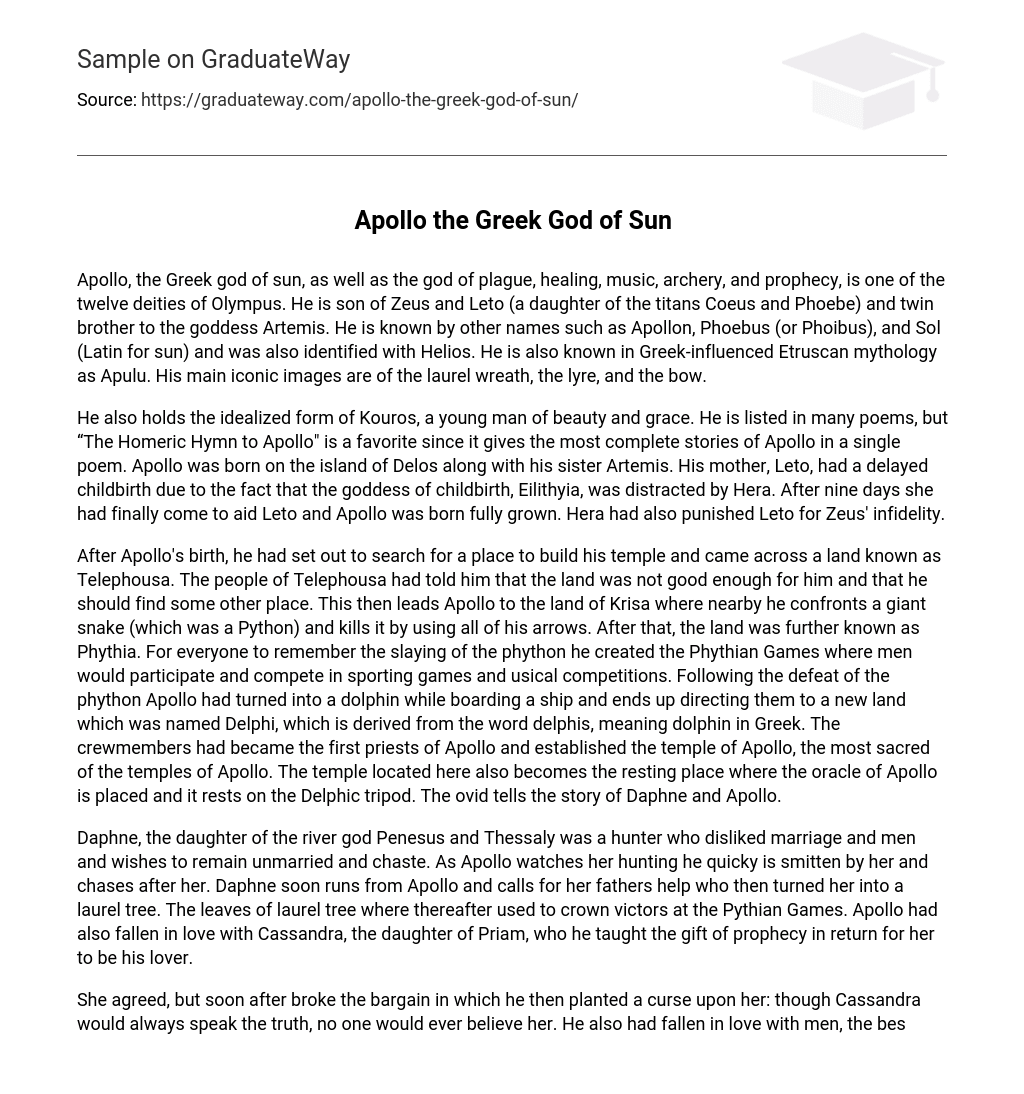Apollo is a Greek god associated with the sun, as well as with plague, healing, music, archery, and prophecy. He is one of the twelve deities on Mount Olympus and is the son of Zeus and Leto. Additionally, he is the twin brother of Artemis. Apollo goes by other names such as Apollon, Phoebus (or Phoibus), and Sol (which means sun in Latin). He is also connected with Helios and is known as Apulu in Etruscan mythology influenced by the Greeks. The laurel wreath, lyre, and bow are his primary symbols.
Apollo is depicted in the form of Kouros, a beautiful and graceful young man, and is mentioned in various poems. However, “The Homeric Hymn to Apollo” is particularly favored as it provides the most comprehensive stories about him in a single poem. Apollo and his sister Artemis were born on the island of Delos. Leto, their mother, experienced a delayed childbirth as the goddess of childbirth, Eilithyia, was preoccupied by Hera. After a wait of nine days, Eilithyia finally came to assist Leto, and Apollo was born fully grown. Additionally, Leto faced punishment from Hera as a result of Zeus’ unfaithfulness.
After the birth of Apollo, he embarked on a search for a suitable location to build his temple. He stumbled upon a land called Telephousa, but its inhabitants advised him to search elsewhere. Apollo then discovered Krisa, where he encountered a monstrous snake (known as Python) and defeated it with his arrows. As a result, the land became known as Phythia. To commemorate the victory over the Python, Apollo established the Phythian Games, which involved sporting and musical competitions for men. After slaying the Python, Apollo transformed into a dolphin while aboard a ship, guiding them to a new land called Delphi, derived from the Greek word delphis meaning dolphin. The ship’s crew became the first priests of Apollo and built his temple, regarded as the most sacred among all of his temples. In this temple resided the oracle of Apollo, resting upon the Delphic tripod. The text also mentions Ovid’s story of Daphne and Apollo within this context.
Daphne, the daughter of the river god Penesus and Thessaly, was a hunter who did not want to get married or be around men. She wanted to stay single and pure. While Daphne was hunting, Apollo started to develop feelings for her and began chasing after her. Daphne tried to escape from Apollo and cried out for help from her father. In response, her father turned her into a laurel tree. From then on, the leaves of the laurel tree were used to create crowns for winners at the Pythian Games. Alongside his infatuation with Daphne, Apollo also fell in love with Cassandra, the daughter of Priam. Apollo taught Cassandra the gift of prophecy in exchange for her becoming his lover.
She agreed, but soon after reneged on the agreement, causing him to place a curse on her. That curse dictated that although Cassandra would always speak the truth, nobody would ever believe her. In addition, Apollo had developed romantic feelings for men, notably including the heroes Hyacinthus and Cyparissus. Apollo fathered numerous children, such as Aristaeus, Asclepius, and, in certain versions of the story, Orpheus. One of his sons, Phaethon, desired to ride his father’s chariot but tragically crashed it, resulting in his death and scorching of the earth. The tale of Asclepius involved his father Apollo granting him the power to heal, but Asclepius misused this ability by resurrecting the dead.
Zeus punished him by striking him dead with a thunderbolt. This angered Apollo, but getting mad at Zeus served no purpose. Instead, Apollo directed his anger towards the Cyclops, the maker of the thunderbolts, and killed him. Zeus, furious about Apollo’s actions, was ready to throw him into Tartarus. However, another god, potentially Apollo’s mother Leto, intervened. Zeus sentenced Apollo to a year of serving as an assistant to King Admetus, a human who treated him kindly. In exchange, Apollo prophesied King Admetus’ future.
Apollo’s connections to plant growth and nature emerged as a result of his romantic involvements with nymphs and individuals who transformed into flowers and trees. Though generally gentle in disposition, Apollo was not without a capacity for cruel punishments. Marsyas, a Satyr who was the offspring of Olympus, discovered a flute and dared to challenge Apollo, asserting that he could create music sweeter than Apollo’s lyre. Ultimately, Marsyas was defeated (there are alternate versions suggesting that Apollo himself was defeated) and Apollo proceeded to flay him alive. Another manifestation of Apollo’s wrath can be seen in the slaughter of Niobe’s offspring.
Niobe boasted of being a better mother than Leto because she had six sons and daughters. However, Apollo killed all of Niobe’s sons, while Artemis killed her daughters. Apollo is associated with certain animals such as the wolf (which is sacrificed to him and depicted with him on coins), the roebuck or hind (important in the worship of Artemis), the vulture and raven (whose flight indicates omens), the swan (which pulls his golden chariot), the snake (which he killed near Krisa), and the dolphin (which he transformed into to help sailors find new land).





